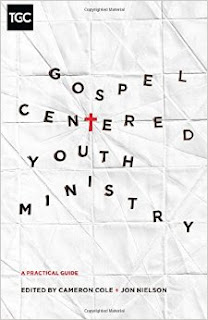AUTHOR: Edited by Cameron Cole and Jon Nielson
PUBLISHER: Wheaton, IL: Crossway, 2016, (176 pages).
 Youth ministry is certainly one of the most crucial ministries in any church. Having it is not just a step of faith. It is investment for the future. The purpose of such a ministry is to help cultivate a sense of discipleship with young people about to enter the adult world. This is especially challenging with the rise of the MTD movement, which teaches people to live a life according to a set of do's and don'ts (moralistic); feel-good self-enrichment activities (Therapeutic); and living as if God is far away (Deism). The core message of this book is about centering youth ministry on the gospel. Through the gospel, every other activity, initiative, and discipleship endeavors are done. Seven major foundations are included here:
Youth ministry is certainly one of the most crucial ministries in any church. Having it is not just a step of faith. It is investment for the future. The purpose of such a ministry is to help cultivate a sense of discipleship with young people about to enter the adult world. This is especially challenging with the rise of the MTD movement, which teaches people to live a life according to a set of do's and don'ts (moralistic); feel-good self-enrichment activities (Therapeutic); and living as if God is far away (Deism). The core message of this book is about centering youth ministry on the gospel. Through the gospel, every other activity, initiative, and discipleship endeavors are done. Seven major foundations are included here:- The centrality of the gospel: Where theology drives methodology
- Discipleship: Where discipleship is the key motif in all youth work.
- Expository teaching: The importance of biblical teaching and the ministry of God's Word
- Relationships: Connecting with young people.
- Community: Helping youths build community in Christ.
- Partnering with Parents: Helping parents be a part of the youth ministry
- Generational Integration: Be inclusive when doing church.
For each of these foundations, each contributor describes what it means, shows from the Scriptures how it is applied, points out the strengths and weaknesses of various applications, and a path forward on how to implement it appropriately. The practical considerations come from the many years of experience working with the young.
Once the foundations are laid, Part Two works on some practical applications. In many cases, it expands on some of the applications mentioned in Part One. On small group study, Jon Nielson urges Bible studies to go deep and to encourage vulnerability in sharing. Some tips include leadership training; using simple tools for study, such as the COMA, the 5Cs, and the Swedish method. In equipping the youths, Nielson continues with some suggestions to enable youth leaders to be trained. Tom Olson believes that the two primary ways in which we let God's Word dwell in us are teaching and singing (Col 3:16). Jason Draper highlights the importance of retreats and special events on both spiritual nourishment for believers and evangelistic opportunities to reach unbelievers. In Part Three, we learn about the specifics of: 1) Evangelism; 2) Serving the needy; 3) Short-term missions.
The 14 contributors come from a wide range of backgrounds. All of them have been either youth ministers, pastors, or run ministries that work directly with youths. In general, the structure of each essay is as follows:
- The Reason for the Specific Emphasis
- Biblical support
- Personal Observations
- Practical Considerations
- Looking Forward
- Additional Resources
Rating: 4.75 stars of 5.
conrade
This book is provided to me courtesy of Crossway Publishers and NetGalley in exchange for an honest review. All opinions offered above are mine unless otherwise stated or implied.
No comments:
Post a Comment